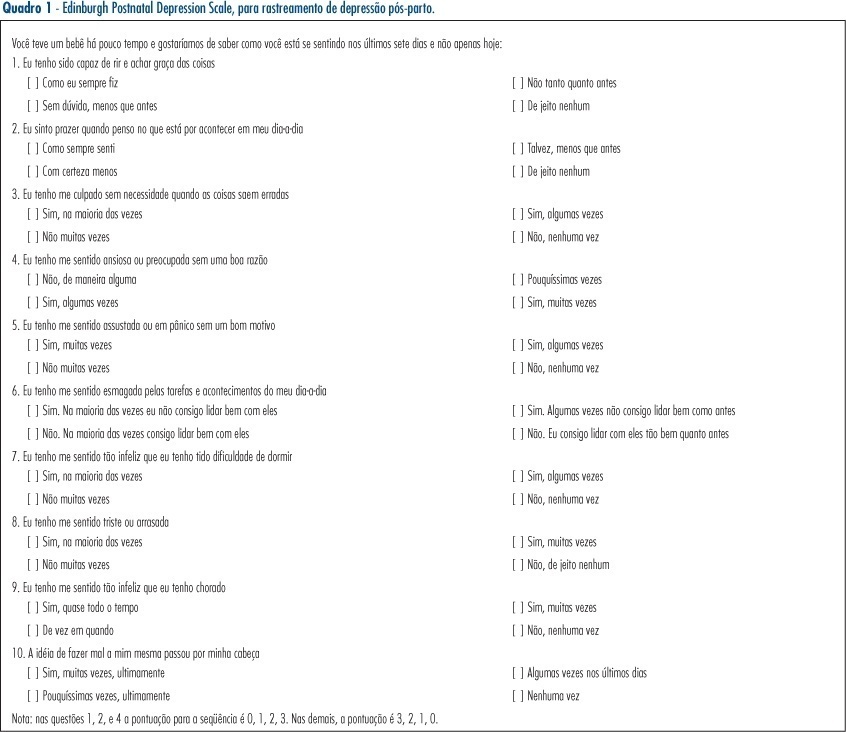Summary
Revista Brasileira de Ginecologia e Obstetrícia. 2013;35(3):130-135
DOI 10.1590/S0100-72032013000300007
PURPOSE: It was to determine the prevalence of depressive symptoms in a sample of puerperal women from Brasília, Brazil, distinguishing cases with onset after delivery from those already present during pregnancy. METHODS: A prospective cohort study with convenience sampling of patients submitted to elective cesarean section at two private hospitals. As an instrument for assessing depressive symptoms, the Edinburgh Postnatal Depression Scale with cutoff >13 was applied shortly before delivery and four to eight weeks after childbirth. RESULTS: Among the 107 women who completed the study, 11 (10.3%) had significant depressive symptoms during pregnancy and 12 (11.2%) during the postpartum period. Among the 12 patients with postpartum symptoms, 6 had symptoms during pregnancy, so that 5.6% of the sample had postpartum onset of depression. The higher overall frequency of depression was significantly among single women than among married women (p=0.04), a fact mainly due to a higher frequency of single women experiencing persistent depressive symptoms both before and after delivery (p=0.002). The risk of depression was not influenced by age, parity or educational level. CONCLUSION: Women with depression identified during the postpartum period comprise a heterogeneous group, in which symptoms may have started before pregnancy, during pregnancy or after childbirth. In this sample, half of the postpartum depression cases already presented symptoms during late pregnancy. Since depression can arise before and after childbirth, it may have different etiologies and, therefore, a different response to treatment, a possibility that should be considered by clinicians and researchers.
Summary
Revista Brasileira de Ginecologia e Obstetrícia. 2007;29(9):470-477
DOI 10.1590/S0100-72032007000900006
PURPOSE: to assess the prevalence of the risk of post-partum depression in women in the post-natal ward of a hospital in São Paulo city, in the southeastern region of Brazil, and analyze the associated factors, including domestic violence (DV). METHODS: this was a descriptive, cross-sectional study. The participants were 133 women with at least 20 weeks of gestation age, who delivered their babies from August to September 2005 in a tertiary maternity in the city of São Paulo (Brazil). They were interviewed using the Portuguese version of the Abuse Assessment Screen for the diagnosis of violence and filled out a self-evaluation questionnaire for post-partum depression (Edinburgh Postnatal Depression Scale). Variables were presented as absolute and relative frequencies. The chi2 or Fisher exact tests were used to analyze possible associations between the variables of interest and post-partum depression. The value of 5% was considered significant. RESULTS: risk for post-partum depression was detected in 24 women (18%). A total of 38.3% of the participants interviewed had a history of abuse. There was an association between DV after they were 15 years old and risk of depression (p=0.036). The prevalence of abuse in the group of women at risk for post-partum depression was 58.3% and this was significantly higher than the 33.9% observed in the control group. CONCLUSIONS: the probability of presenting depression was high among the post-partum women attended at a tertiary maternity in the southeast of Brazil. The DV after they were 15 years old was significantly associated with risk of post-partum depression.
